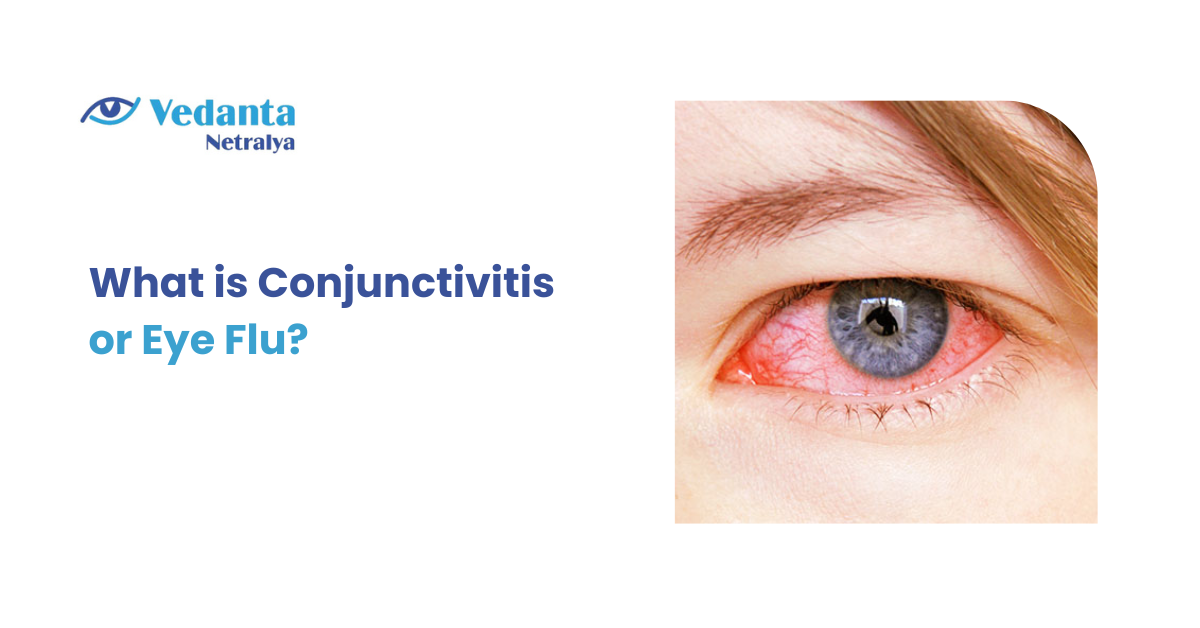
Conjunctivitis, also known as the “eye flu,” frequently begins suddenly with eye irritation, gritty feeling, discomfort, and redness. Although it commonly begins in one eye and spreads to the other after a few days, it usually affects both eyes.
What are the Symptoms of Conjunctivitis?
- The symptoms quickly worsen and include a sticky discharge.
- Patients would complain about their eyelashes clumping in the morning and being unable to open their eyes without cleansing.
- Mild blurring is the most severe visual symptom brought on by the sticky discharge.
- Intolerance to light, often known as photophobia, is a condition that is normally ABSENT.
If these symptoms are present, they point to a condition other than conjunctivitis and should be reported to your eye doctor.
Every red eye should be examined by an eye doctor to rule out other, more dangerous disorders, as conjunctivitis is not the only cause of red eyes. You can find the best eye care through experts at Vedanta Netralaya in Ghaziabad.
Things You Should Not Do When You have Conjunctivitis
- Don’t self-prescribe drugs.
- The only eye drop that you can use without first visiting a doctor is a lubricating eye drop.
- As a top hospital for eye care, eye care doctors at Vedanta Netralaya frequently encounter patients who start using eye drops with steroids in them. This can result in a flare-up of the illness.
- NEVER use any drug that was prescribed to a close friend or relative.
- As conjunctivitis is contagious, some people begin taking the drugs that were recommended for a family member who already had the condition in an effort to “avoid” infection. Sadly, these eye drops serve no prophylactic purpose.
- To stop the sickness from spreading, stay away from crowded areas.
How is common infective conjunctivitis treated?
- Mild infections don’t require any treatment because they go away on their own after a few days.
- Since it removes all the anti-germ proteins that are secreted in the tears, frequent cleaning of the eyes from the inside is not advised.
- To lessen irritation in the eyes, lubricant eye drops can be utilised.
- When a patient has bacterial conjunctivitis, doctors may occasionally administer antibiotic and anti-inflammatory eye drops.
- Contact lenses shouldn’t be worn until all symptoms have disappeared.
How Can You Stop Infecting Other People?
- Viral Conjunctivitis spreads quickly and usually occurs in bursts during the rainy season. Through contact and through objects contacted by contaminated hands, it spreads. The most crucial method for preventing dissemination to others is frequent handwashing.
- Wash your hands frequently throughout the day, especially after coming in contact with an infected eye.
- Several of these conjunctivitis-causing viruses are not effectively treated by alcohol-based hand sanitizers, which is why frequent handwashing is still necessary. It’s also crucial to refrain from using any of the patient’s linens, pillows, handkerchiefs, or cutlery.
Also read: What to expect before, during, and after LASIK eye surgery?
Does Wearing Sunglasses Help?
The use of sunglasses or any other type of safety eyewear is not necessary for the treatment of conjunctivitis. Wearing sunglasses doesn’t prevent the spread of illness, and it can’t be spread by staring directly into the infected eye.
How Should a Patient Prevent Conjunctivitis from spreading?
To prevent it from spreading to other close contacts, confine it to the job or school. The best strategy to stop spread is to remain at home until there is no longer any ocular discharge (s). Using a computer, phone, or television is permitted if the patient feels comfortable.
Should You continue to wipe my eyes in order to prevent infection?
It is not advised to treat an infection by often washing the interior of inflamed eyes with tap water. The process of recovery is not accelerated by it. In fact, it removes all the pathogen-killing anti-infective proteins secreted by the eyes.
When should You See a Doctor?
Each patient must be screened in order to confirm the diagnosis.
If any of the following symptoms exist, a review should be conducted as well.
- Apparent eye pain
- An aversion to light (photophobia).
- Blisters or skin sores close to the eye.
- Blurry vision that doesn’t clear up after blinking
Conclusion
If you think you or your family members have been infected with Conjunctivitis, it is necessary to seek immediate care as this infection spreads fast and can do serious damage to the eyes. Visit Vedanta Netralaya for the best care and treatment of Conjunctivitis.
